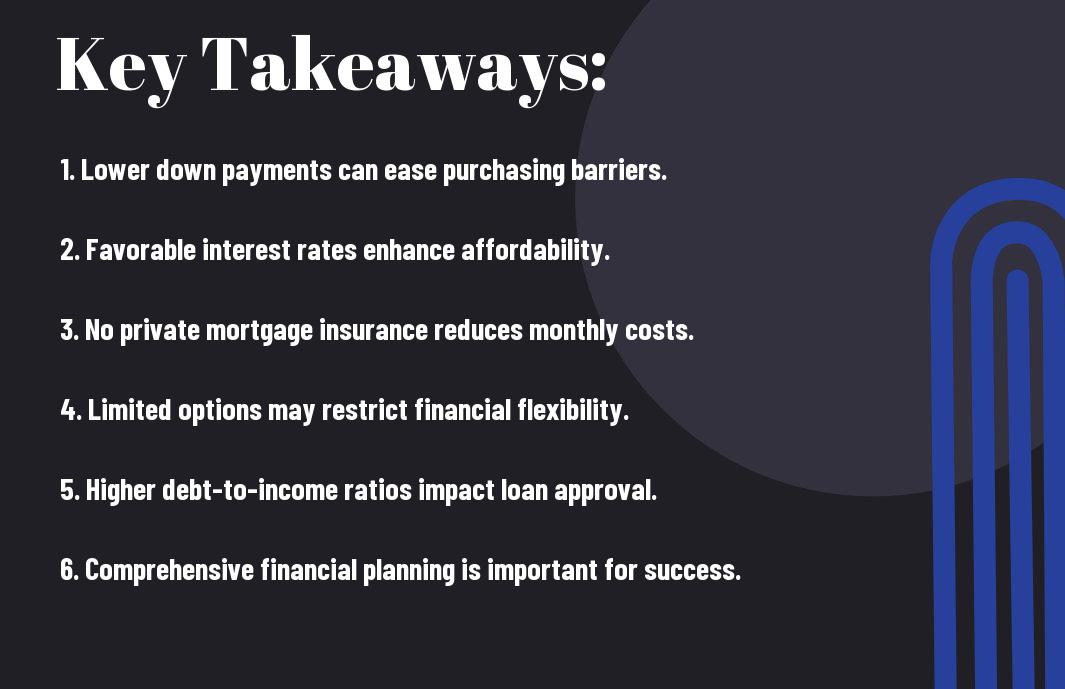With the rising cost of education and the unique financial challenges faced by medical professionals, understanding the intricacies of doctor loans is vital for you as a physician. These specialized loans can offer favorable terms tailored to your situation, but they also come with specific drawbacks that you need to weigh carefully. In this post, we’ll explore the advantages and disadvantages of doctor loans, providing you with the insights needed to make informed financial decisions for your future.

Understanding Doctor Loans
Before you initiate on your journey into the world of doctor loans, it’s vital to grasp their definition and purpose. These specialized financial products are designed specifically for medical professionals, acknowledging the unique financial circumstances you face as a physician. Whether you are just beginning your career or have years of experience, doctor loans offer tailored options to help you secure funding for your home, often accommodating high debt levels due to medical school loans.
Definition and Purpose
Against traditional mortgage requirements that typically emphasize a steady income and minimal debt-to-income ratios, doctor loans provide more flexibility. They usually do not require a down payment and may allow you to borrow more than standard loans would permit. The purpose of these loans is to alleviate the financial burden of entering the home market, enabling you to focus on your medical career with less stress about meeting conventional lending criteria.
Types of Doctor Loans
One of the key benefits of doctor loans is the variety of options available to you. Generally, doctor loans can be categorized into five main types, each catering to different needs and financial situations. Understanding the nuances of each type can help you make informed decisions that align with your career trajectory and personal goals. The following table outlines the key types of doctor loans and their features:
| Type | Features |
| Conventional Doctor Loans | No down payment, no private mortgage insurance (PMI) |
| FHA Loans | Lower down payment options, more accessible for new graduates |
| VA Loans | Available for veterans, with potential for 0% down payment |
| USDA Loans | For rural properties, often with no down payment required |
| Jumbo Loans | For high-value properties, accommodating higher loan amounts |
Due to the unique needs of medical professionals, lenders may offer customized features, such as extended repayment terms or reduced interest rates. Depending on your financial status and personal preferences, you may find that certain types of loans align more closely with your long-term plans than others. The following list summarizes some considerations to make when selecting a type of doctor loan:
- Assess your financial situation and long-term goals.
- Evaluate the terms and conditions of the loan options.
- Consider the advantages of no down payment, if applicable.
- Research lenders who specialize in physician loans.
- Recognizing the different types available can guide your decision-making process.


Advantages of Doctor Loans
It is necessary to understand the advantages of doctor loans, as they are tailored specifically for medical professionals. These loans can provide options that may not be available with conventional mortgage loans, paving the way for a smoother transition into homeownership. By capitalizing on the unique financial landscape that physicians often navigate, doctor loans can offer significant benefits that can ease your financial burden during a busy start in your career.
Low or No Down Payment
Before venturing into the world of home loans, it is wise to evaluate the appealing aspect of low or no down payment options with doctor loans. Many lenders recognize the financial constraints that come with extensive medical training, which often leaves you with limited savings for a down payment. As a result, some doctor loans allow qualified applicants to secure a mortgage with little to no money down, facilitating homeownership without the added stress of accumulating a large sum of cash upfront.
Favorable Interest Rates
To enhance the attractiveness of doctor loans, you may also benefit from favorable interest rates compared to other traditional mortgage options. Given your position as a medical professional, lenders often feel more secure extending these loans, understanding the earning potential and stability that comes with your occupation. This favorable rate can mean lower monthly payments, saving you money over the life of the loan and making it more feasible for you to invest in your future home.
Further, the competitive interest rates associated with doctor loans can lead to significant savings when compared to conventional mortgages. As you navigate the home-buying process, it’s worth considering not only the initial mortgage payment but also how interest will accumulate over time. A lower rate can improve your overall financial position, allowing you more freedom to allocate funds towards important life goals, such as retirement or furthering your education. By taking advantage of these favorable terms, you can find a balance between your current financial obligations and future aspirations with confidence.
Disadvantages of Doctor Loans
Not all aspects of doctor loans are favorable for physicians. Among the most significant downsides is the fact that these loans often come with higher interest rates compared to conventional loans, which can result in substantial extra costs over the life of the loan. While these loans are designed to accommodate the financial circumstances of new doctors, the trade-off may not always be worth it when you consider the long-term financial implications.
Higher Interest Rates Compared to Conventional Loans
| Aspect | Doctor Loans |
|---|---|
| Interest Rates | Generally Higher |
| Down Payment | Low or No Down Payment |
| Credit Score Requirements | More Flexible |
Any financial decision comes with the risk of potential debt accumulation, especially if you find yourself in a situation where your loan terms may not be favorable to your long-term financial health. With the convenience of doctor loans, you may be tempted to borrow more than you actually need at the start of your career. This could lead to a cycle of excessive debt that becomes burdensome over time, particularly if your income does not increase as anticipated in your early years of practice.
Potential Debt Accumulation
It is important to evaluate your borrowing needs critically and to avoid the pitfall of overextending yourself financially. While the allure of a larger loan might seem appealing as you establish your practice, excessive debt can create financial stress and limit your ability to pursue future opportunities. The responsibility lies with you to manage your finances prudently, ensuring that your loan does not turn into a long-term burden that impacts your lifestyle and career choices.
Who Should Consider Doctor Loans?
New Graduates vs. Established Physicians
One of the primary considerations when deciding on a doctor loan is your stage in your medical career. If you are a new graduate or a resident, you may find that your financial situation is quite different compared to established physicians. New graduates often carry significant student loan debt and might not have the credit or income history to qualify for traditional loans. Doctor loans can help you bridge this gap, offering access to financing with favorable terms despite your current financial situation.
On the other hand, established physicians may have more financial flexibility, but they can also benefit from doctor loans. If you’re looking to purchase a new home or invest in real estate, doctor loans can still be a compelling option due to their unique features, such as lower down payment requirements and no private mortgage insurance (PMI). Ultimately, assessing your current professional status and long-term financial goals will guide you toward making the best decision regarding doctor loans.
Financial Situations to Consider
Behind every financial decision lies your unique financial situation. When contemplating a doctor loan, you’ll want to evaluate factors such as your overall debt load, income stability, and creditworthiness. If you are graduating with substantial student loans, you must consider how this debt will impact your overall financial health, as it may limit your borrowing capacity. A doctor loan may provide you with the opportunity to secure financing while managing your student debt more effectively.
Consider your short-term and long-term financial goals when deciding if a doctor loan is right for you. Are you planning to buy a home quickly after graduation, or do you anticipate more financial stability in the coming years? The evaluation of your current income, debt-to-income ratio, and savings can play a significant role in your decision. It’s vital to weigh the pros and cons of doctor loans against your existing financial obligations to determine if this financial tool can help you reach your aspirations more effectively.
Alternatives to Doctor Loans
For physicians seeking financial options, understanding alternatives to doctor loans can broaden your perspective on securing funding for your needs. While doctor loans are designed with specific features tailored for medical professionals, conventional loans present a viable alternative worth considering. These loans are often easier to access if you have a solid credit history and a stable income. They typically offer competitive interest rates and a straightforward application process, allowing you to tailor the loan amount to fit your financial needs.
Conventional Loans
Behind the appeal of conventional loans is their flexibility and the potential for lower interest rates compared to doctor loans. When applying for a conventional loan, you may not face the same requirements regarding student debt, which can be a considerable advantage if you have a significant amount to repay. However, it’s important to understand that these loans often require a larger down payment, usually between 5% and 20%, which can be challenging if your cash reserves are limited.
FHA and VA Loans
By opting for FHA and VA loans, you have access to favorable terms that may be better suited for your financial situation. FHA loans, insured by the Federal Housing Administration, allow for lower down payments and more lenient credit requirements, which could be particularly helpful if your financial status is still evolving as a new physician. VA loans, available exclusively to veterans and active-duty military personnel, can offer zero down payment options, competitive rates, and no private mortgage insurance, making them a highly attractive choice.
It’s important to assess your eligibility for FHA and VA loans as these programs have specific guidelines that can benefit you significantly. For FHA loans, you may qualify with a credit score as low as 580 with a down payment of 3.5%. VA loans typically require proof of service but can provide an excellent opportunity to secure favorable financing terms without the burden of monthly PMI. Because these alternatives can enhance your purchasing power, evaluating them in comparison to doctor loans is advisable for making an informed decision regarding your financing needs.
Key Considerations Before Applying
Your journey towards securing a doctor loan begins with a thorough understanding of your current financial health. This includes not only your credit score but also other financial considerations that lenders take into account. A strong credit score often translates to better loan terms, making it imperative for you to know where you stand. Regularly checking your credit report can help you identify any areas that may need improvement before you submit your application. Additionally, understanding your overall financial situation, such as debt-to-income ratios and existing financial obligations, will better prepare you for what to expect in the loan approval process.
Credit Score and Financial Health
Across lenders, your credit score can be one of the primary factors that determine your eligibility for a doctor loan. Generally, a higher score may not only enhance your chances of approval but could also secure you more favorable interest rates. It’s advisable for you to engage in measures that elevate your score before applying, such as paying down existing debts, ensuring timely bill payments, and addressing any inaccuracies on your credit report. Moreover, your overall financial health is also assessed, which includes looking at your savings and investment portfolios. Lenders will be interested in knowing whether you can manage additional debt alongside your current financial commitments.
Long-Term Financial Goals
Considerations regarding your long-term financial goals are integral as you contemplate applying for a doctor loan. These goals can range from retirement plans to the desire to purchase a home or invest in further education. It is imperative for you to align your mortgage decisions with these aspirations. A doctor loan may offer lower down payment options and exclusive benefits tailored for medical professionals, but if they extend your financial commitments over a more extended period than anticipated, they may hinder your overall financial objectives. As you evaluate the terms of the loan, think about how they fit within your path toward achieving stability and growth in your personal finances.
Due to the distinctive financial landscape many physicians navigate, weighing your long-term goals against the benefits and burdens of a doctor loan is paramount. Consider how your present situation influences your future aspirations, and explore whether a doctor loan supports your desired lifestyle and financial trajectory. It’s advisable to outline your goals clearly and engage in discussions with financial advisors or mentors to ensure that your loan choices align favorably with your aspirations.
To wrap up
Taking this into account, examining the pros and cons of doctor loans is crucial for you as a physician navigating your financial journey. These specialized loans offer benefits like competitive interest rates and flexibility tailored to your unique situation. However, it’s important to weigh these advantages against potential drawbacks such as higher fees or limited loan amounts based on your financial history. By carefully assessing these factors, you can make an informed decision that aligns with your long-term goals.
Ultimately, choosing the right loan option involves not just understanding the terms but also considering your personal financial landscape. Make sure to analyze your current debts, financial commitments, and the future financial environment you anticipate as you progress in your career. By doing thorough research and consulting with financial advisors, you can position yourself to take full advantage of what doctor loans offer while avoiding any pitfalls that may arise.




